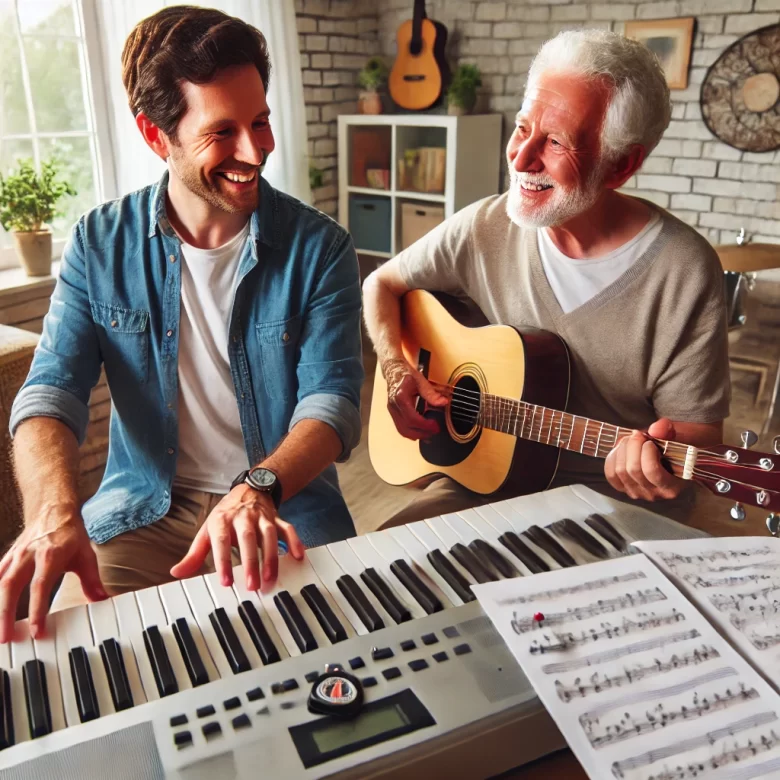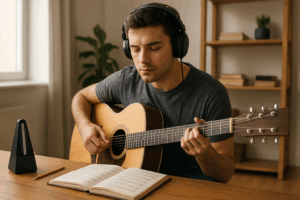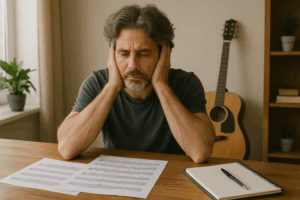Many people believe that if they didn’t learn music as a child, they missed their chance. But the truth is, it’s never too late to pick up an instrument, start singing, or dive into musical theory. The benefits of learning music at any age are immense, and adults often bring unique strengths to the learning process.
Why Music Is for Everyone — At Any Age
Music is universal. You don’t need to be a prodigy or start at age five to enjoy or succeed in music. Adults bring:
- Patience and discipline
- Clear goals and motivation
- A deeper emotional connection to music
As an adult, you may approach music more intentionally. You’re not learning because someone told you to — you’re learning because you want to. That passion fuels long-term commitment and enjoyment.
Cognitive and Emotional Benefits of Learning Music Later in Life
Learning music exercises your brain like few other activities:
- Improves memory and focus
- Boosts creativity and problem-solving
- Reduces stress and anxiety
- Increases mindfulness and emotional awareness
It activates both hemispheres of the brain simultaneously. You’re reading, listening, moving, and thinking — often all at once. This multitasking builds strong neural pathways and promotes long-term brain health.
Many adults find that practicing music becomes a form of meditation. It helps them unwind after a busy day, process emotions, and stay mentally sharp.
Physical Advantages: Coordination, Hearing, and Fine Motor Skills
Playing an instrument sharpens coordination and fine motor skills. It also:
- Enhances hand-eye coordination
- Improves posture and breathing (especially with wind instruments or singing)
- Stimulates auditory processing and listening skills
These physical benefits are especially valuable as we age. Music can even support physical therapy goals by improving dexterity, range of motion, and muscle control.
Emotional and Social Rewards of Playing Music
Music connects people. Whether playing alone or with others, music helps:
- Build confidence and self-expression
- Foster social interaction and collaboration
- Create a sense of achievement and joy
Adults often find a new sense of community through music. Choirs, bands, online groups, and workshops are great places to meet others who share the same passion.
Performing for family or friends — even just sharing a song over a video call — can also boost self-esteem and strengthen relationships.
Learning Music as an Adult vs. as a Child
There are key differences, but not disadvantages:
- Adults often learn faster intellectually, grasping theory and structure.
- Children may develop physical skills more quickly, but adults can compensate with focus and determination.
- Adults usually choose to learn, which increases motivation and satisfaction.
You may not have as much free time as a child, but the time you do spend with music tends to be more focused and meaningful.
Challenges Adults May Face — And How to Overcome Them
Yes, adults face hurdles:
- Limited time: Prioritize short, consistent practice sessions. Even 10 minutes a day can lead to progress.
- Fear of failure: Embrace mistakes as part of growth. Every missed note is a step toward mastery.
- Self-doubt or embarrassment: Focus on personal progress, not perfection. Remember, everyone starts somewhere.
- Physical tension: Stretch and warm up before playing. Pay attention to posture and ergonomics.
The key is mindset. Approach music as a joyful exploration, not a race. Be kind to yourself and celebrate small wins.
Tips for Getting Started with Music at Any Age
- Pick the right instrument: Choose one that fits your space, schedule, and interests.
- Set small, clear goals: Start with 10-minute sessions or one song. Gradually increase challenge.
- Find the right teacher or resource: Look for someone who works well with adult beginners, in-person or online.
- Use tech tools: Apps and video lessons make learning fun and accessible. Try Yousician, Simply Piano, or Fender Play.
- Practice regularly but gently: Progress happens over time, not overnight. Keep it enjoyable.
Also consider joining group lessons, jam sessions, or online forums for encouragement and accountability.
Success Stories: It’s Never Too Late
- A 60-year-old learns to play cello and joins a community orchestra.
- A retired teacher starts piano and plays at family gatherings.
- A 45-year-old learns to sing jazz and records their first song.
- A 70-year-old begins drumming to improve motor skills and finds a new passion.
These aren’t rare cases — they’re everyday people finding joy in music. If they can do it, so can you.
Choosing the Right Instrument Based on Your Lifestyle
Consider these questions:
- Do you prefer soft or energetic sounds?
- Do you want to play alone or with others?
- How much time can you practice weekly?
- Do you travel often or need something portable?
Popular choices for adults:
- Piano/keyboard: Versatile and great for theory
- Guitar/ukulele: Portable and social
- Voice: Always with you, no equipment needed
- Digital instruments: Quiet and flexible, great for apartments
Your lifestyle should guide your choice. What matters most is finding an instrument you enjoy spending time with.
Final Thoughts: The Joy of Music Is Timeless
The benefits of learning music at any age go far beyond the notes. It’s about mental growth, emotional healing, physical coordination, and meaningful connection.
No matter your age, music welcomes you. You bring your life experiences, your stories, and your soul into each note. And that’s something no child prodigy can replace.
So go ahead — pick up that instrument, sing that song, take that first step. It’s never too late to start. And the music you make will be uniquely yours.




